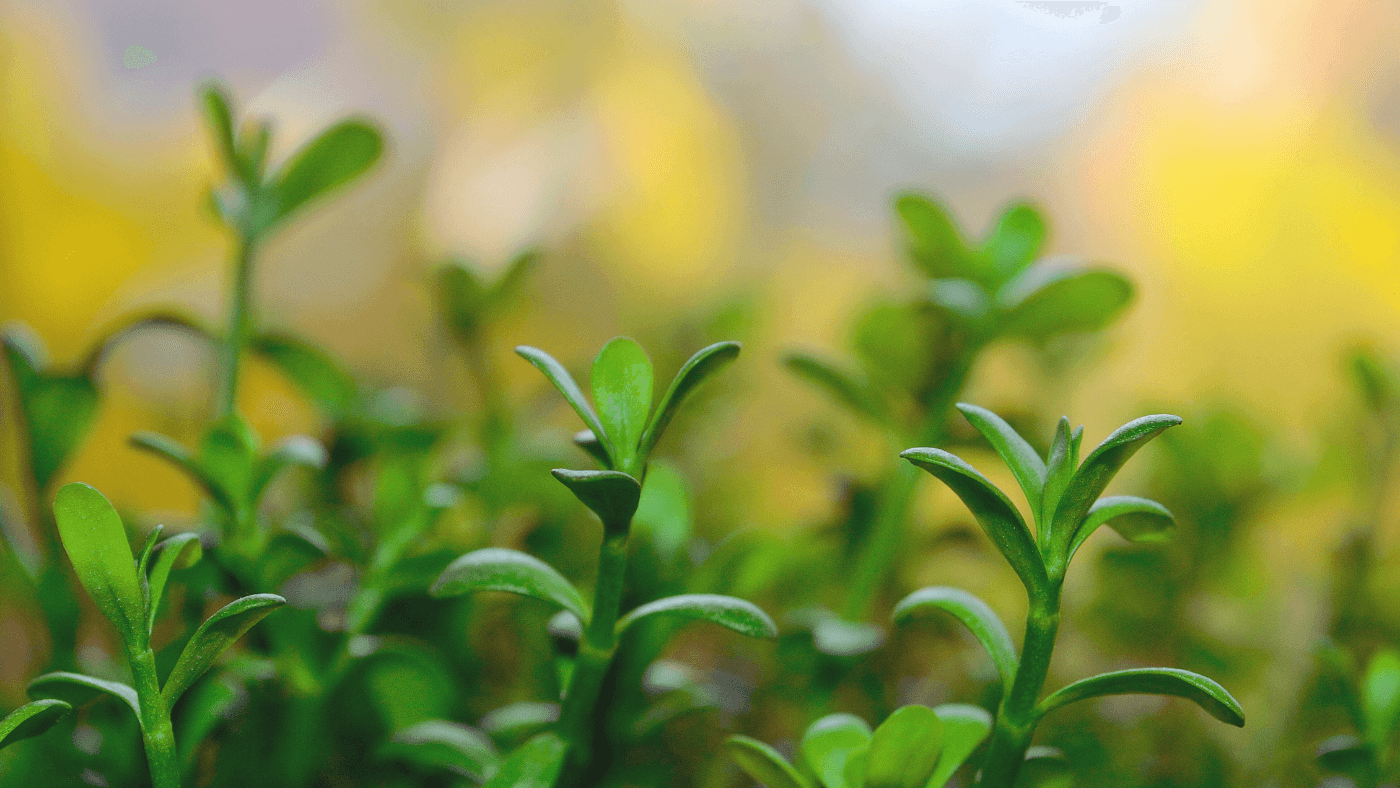Bacopa - Bacopa monniera
Have you ever walked into a room and forgotten why?
Bacopa is one of my favorite herbs to recommend when my ADHD, both young and old, struggle with forgetfulness, chronic mental fatigue, or memory issues. This herb has a long history of safe use and has been trusted for centuries to enhance memory, especially in the elderly.
This herb has been a cornerstone of Ayurvedic Medicine since the sixth century A.D. Traditionally used in India and Asia, it supports nerve health, improves memory, and reduces mental fatigue, making it an excellent brain tonic. The name brahmi derives from the word “Brahma”, the mythical “creator” in the Hindu pantheon. Bacopa has been used in the Ayurvedic medicinal system for approximately 3000 years and is classified as a medhyarasayana, a drug used to improve memory and intellect
For those with ADHD, it is especially beneficial as it helps increase comprehension, concentration, and memory recall. Bacopa's acetylcholinesterase activity supports the metabolism of neurotransmitters and nutrients like choline, crucial for brain health.
Despite its ability to invigorate a depleted nervous system, Bacopa is not an intensely stimulating herb. In fact, it can be very calming and even help restore disrupted sleep patterns. This dual action, where Bacopa can rejuvenate those who are fatigued and calm those who are agitated, showcases its balancing capacity.
It's no surprise that Bacopa is affectionately known as the "Herb of Grace," and its common name, Brahmi, means "god-like."
Bacopa: Bacopa monniera
Family: Scrophulariacea
Plant parts used: Aerial parts and roots
Where this plant grows: Tropical wetlands - Florida, California, Australia, India, Asia
Energetics: Cooling
Taste: Bitter, astringent, sweet
Actions: Nervine, nootropic, tonic
Other names: Brahmi (strong), Water Hyssop, Herb of Grace
Bacopa May Be For You If You Have Any of These Symptoms
- Hyperactivity
- Trouble focusing
- Obsessive Compulsive Disorder
- Dementia symptoms
- Poor working memory
- Brain Fog
- Insomnia
- Stress
- Epilepsy
- Mood imbalances
- Learning disabilities
- Inflammation
Modern Use, Clinical Evidence and Neurodivergent Support
Bacopa aka brahmi is commonly used to improve memory, treat insomnia, manage epilepsy, and reduce anxiety. Numerous clinical studies have shown that Bacopa can help with verbal learning, delayed word recall, memory acquisition, and anxiety reduction, making it a calming cognitive enhancer.
Bacopa monnieri, known for enhancing cognitive performance, has been extensively studied in various clinical trials. In a 2014 study, participants showed significant improvement in mental tasks such as arithmetic, visual tracking, and mood, along with a reduced stress response after taking Bacopa. Another study with healthy adults found that Bacopa use over 12 weeks reduced anxiety levels.
A meta-analysis of nine trials involving 437 people found that Bacopa improved attention speed, cognition, and reaction time. In a double-blind, placebo-controlled study with 54 adults, those taking Bacopa for 12 weeks showed better memory recall and the ability to ignore irrelevant information compared to the placebo group.
A 12-week Bacopa regimen significantly improved memory acquisition and retention for older adults. Bacopa also helps reduce anxiety, especially when combined with Gotu kola (Centella asiatica), as shown in double-blind, randomized trials.
Emerging Evidence for Bacopa in ADHD Management
A comprehensive review and metanalysis of 15 controlled trials, including 9 high-quality double-blind, placebo-controlled designs, provides preliminary evidence for the potential of Bacopa monnieri, an Ayurvedic nootropic herb, in improving cognitive deficits associated with ADHD.
The review highlights Bacopa's positive impact on memory, sustained attention, cognitive flexibility, processing speed, working memory, impulse control, anxiety reduction, and overall learning capacity. Notably, cognitive assessments revealed a 3-19% improvement in participants taking Bacopa compared to the placebo group.
Interestingly, the traditional use of Bacopa in India aligns with these findings. Schoolchildren there commonly consume Bacopa daily to support focus and concentration. Further bolstering this potential benefit, a double-blind trial demonstrated Bacopa's efficacy in reducing all core ADHD symptoms in participants.
The proposed mechanisms of action for Bacopa include its antioxidant properties that combat neuronal oxidative stress, cholinesterase modulation to enhance acetylcholine levels, anti-inflammatory effects to reduce neuroinflammation, and calcium regulatory functions promoting synaptic plasticity and long-term potentiation. These mechanisms align with preclinical data suggesting Bacopa's neuroprotective benefits in various neurological conditions.
This research suggests Bacopa monnieri may be a valuable tool in your ADHD management toolkit. However, It's crucial to individualize patient care and consider potential interactions with existing medications.
Historical Dosing Suggestions
KP Khalsa & Dr. Tierra’s Ayurvedic Materia Medica
-
Powder - Adults: 2 grams daily in water.
-
Pediatric Syrup: 1 gram daily for 3 months.
David Winstons Adaptogens
-
Tincture: 1:5 or 1:2 (30-50 drops), 3-4x daily
-
Tea: 1 tsp in 8 oz water. Steep for 40 minutes. Drink 4oz 3x daily. Modern Dosing Suggestions
Clinical Dosing Suggestions
-
Bacopa Extract: 320 - 650 mg for 12 weeks
-
Dry Herb: 5 - 10 grams divided into 3; daily
- Tincture: 3mL in 60mL water; 3x daily
Enjoy More Bacopa, Here is a Recipe
Energizing Bacopa MilkLooking for a tasty way to boost your brainpower? Try this energizing Bacopa milk decoction! This traditional Ayurvedic recipe not only enhances the tonic qualities of Bacopa but also includes warming spices to balance its cooling nature. Perfect for improving focus and memory, this drink is a game-changer for anyone with ADHD. Ingredients
Directions
|
Safety Profile for Bacopa Monerri and Drug or Nutrient Interactions
- Use caution if you have hyperthyroid conditions; it may increase in T4 levels.
- Bacopa has been shown to reduce the neurotoxin and hepatic toxin effects of medications like Dilantin and Morphine.
- Organic products are important as Bacopa can have toxic heavy metals. Please purchase tea from a reliable source like Mountain Rose Herbs.
- Bacopa has a high therapeutic index, meaning it is generally safe and well-tolerated. The most common side effects are mild and include increased stool frequency, nausea, and abdominal cramps. Unless you are taking any of the medication below, in that case, there may be additional side effects.
- Bacopa has been shown to inhibit human cytochrome P450 enzymes, which can lead to herb-drug interactions when taken with certain medications. When Bacopa is taken orally with these medications, it could potentially alter their effectiveness or increase the risk of side effects due to changes in how the drugs are metabolizedCommon drugs that are metabolized by these enzymes and may interact with Bacopa include:
- CYP1A2: Antidepressants (e.g., fluvoxamine), antipsychotics (e.g., clozapine), and caffeine.
- CYP2C9: Nonsteroidal anti-inflammatory drugs (NSAIDs) like ibuprofen and naproxen, as well as certain antidiabetic medications (e.g., glipizide).
- CYP3A4: Statins (e.g., atorvastatin), calcium channel blockers (e.g., verapamil), and some antiepileptic drugs (e.g., carbamazepine).
- CYP2C19: Proton pump inhibitors (e.g., omeprazole), certain antiepileptic drugs (e.g., diazepam), and some antidepressants (e.g., sertraline).
My Favorite Bacopa Products
You will need to log into my clinical dispensary to view the products and purchase if interested
| I am not giving medical or personal dosing advice.I am showcasing products I like to use with my own clients. Please check with your provider before starting any supplements. If you would like my advice on dosing and a functional approach to managing your ADHD, please book with me here. |
References
- Walker, E. A., & Pellegrini, M. V. (2023). Bacopa monnieri. In StatPearls. StatPearls Publishing.
- Kean, J. D., Kaufman, J., Lomas, J., Goh, A., White, D., Simpson, D., Scholey, A., Singh, H., Sarris, J., Zangara, A., & Stough, C. (2015). A Randomized Controlled Trial Investigating the Effects of a Special Extract of Bacopa monnieri (CDRI 08) on Hyperactivity and Inattention in Male Children and Adolescents: BACHI Study Protocol (ANZCTRN12612000827831). Nutrients, 7(12), 9931–9945. https://doi.org/10.3390/nu7125507
- Winston, D., & Maimes, S. (2007). Adaptogens : herbs for strength, stamina, and stress relief. Healing Arts Press. https://www.overdrive.com/search?q=8BE0B5C0-E5FB-4C12-9624-7962D33CCA30
- Stansbury, J. (2020). Herbal formularies for health professionals volume 4 : neurology, psychiatry, and pain management, including cognitive and neurologic conditions and emotional conditions. Chelsea Green Publishing.
- Bhardwaj, D. S., Rathee, D. V. S., & Rathee, D. N. K. (2023). Efficacy of Bacopa Monnieri in Enhancing Cognitive Outcomes and Its Therapeutic Potential for ADHD: A Metasynthesis. Journal of Advanced Analytics in Healthcare Management, 7(1), Article 1.


